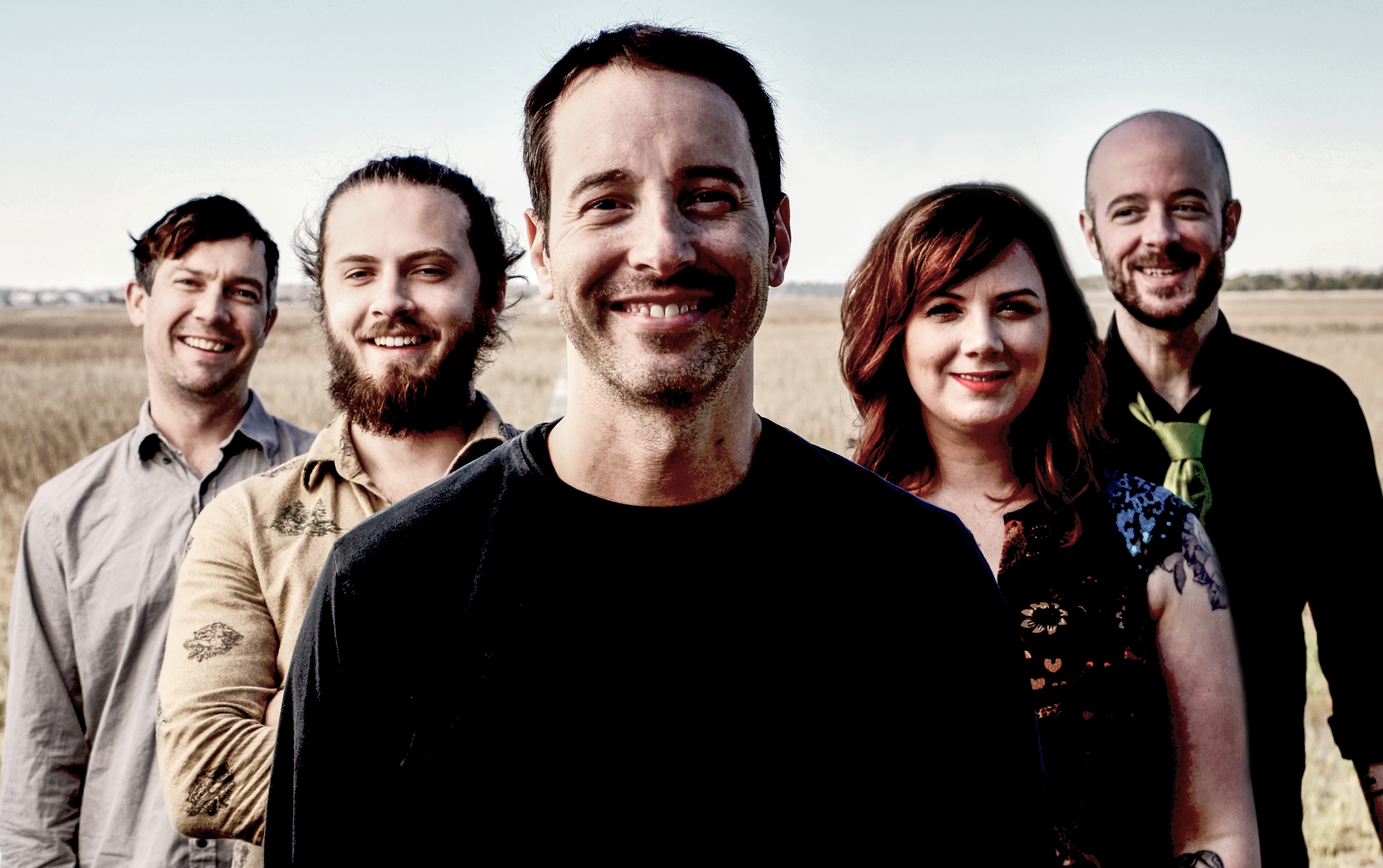Yonder Mountain String Band: Party of Five

Ben Kaufmann opened his eyes at 6:40 A.M. on April 20 to the sound of his son’s voice, calling him to come “play trains.” He got out of bed in his Northern California home and made breakfast for his family. Then, the two converged on the train set. After hitting the road hard in early 2015 with his group of jamgrass pioneers Yonder Mountain String Band, everything was finally in its right place.
“It was the same breakfast, the same place, the same little voice,” says Kaufmann. “But my appreciation of those things was completely different.”
Two weeks earlier, Kaufmann stood up from his hotel bed in Reno, Nev. and felt a bolt of pain rip through his gut. He dragged himself through the show that night, relying on adrenaline from the crowd to push him along, and then was off to Oakland and Los Angeles, swallowing the pain—as well as a few Advil—that was searing his kidney. The three days were crushing and as he stepped back onto the tour bus in Los Angeles, he knew that it was past time to find an emergency room.
Those days, and the hospital stay that followed, were already a bad memory as Kaufmann ate breakfast with his wife and son in late April. They were a bookend to one of the most dramatic years in the lives of both Kaufmann and Yonder Mountain String Band: In April 2014, Yonder’s mandolin player and co-founder Jeff Austin announced that he was leaving the band to launch a solo career, sending a divisive ripple through the band’s fanbase and the blue- grass world at large.
But often, clarity comes after pain. And, on this morning, Kaufmann saw that clearer than ever: “Almost a year ago, we made what was probably the most difficult decision of my life: to basically break up the original Yonder Mountain,” he recalls. “But musically, that was the best thing that’s ever happened to us.”
On June 16, Yonder Mountain String Banc will release their latest album and will celebrate with release parties at the 42nd Telluride Bluegrass Festival in Colorado, where the band will perform throughout the weekend. The record is called Black Sheep, and it’s the band’s first without Austin. In his place, the remaining Yonder members—guitarist Adam Aijala, banjoist Dave Johnston and bassist Kaufmann—are joined by mandolin player Jake Jolliff and fiddler Allie Kral. The new players’ musical fingerprints are all over Black Sheep; Jolliff ’s playing is controlled but forceful, and Kral’s violin and vocals both swirl like gusts of wind through the album’s 10 tracks.
Yonder Mountain String Band have always blurred bluegrass boundaries, coloring inside and outside the lines of the rigid music form set back in the 1940s. With Black Sheep, the band’s instru- mentation honors the traditional bluegrass setup of mandolin, banjo, guitar, fiddle and bass for the first time. But they are still pranksters at heart, and tucked after the thumping title track is a cover of ‘70s punk icons the Buzzcocks’ “Ever Fallen in Love (With Someone You Shouldn’t Have).”
Yonder first assembled in 1998. Austin and Johnston had spent time together in the long-defunct Bluegrassholes, and the two relocated to Colorado, where they met Kaufmann and Aijala. They were not a group of porch-dwelling Southern gentlemen. These were rock-and-roll kids, drawn to the speed and straightforward storytelling of bluegrass.
“Musically, you’ve got short songs with literal lyrics. There’s a lot of energy and they just bang it out and it’s done,” says Aijala. “The Minutemen, the Dead Kennedys—they sang exactly what they felt and it’s over, next song. [Punk rock] drew me to bluegrass.”
But heavy gigging, and a reverence for the Grateful Dead, pushed the newly minted Yonder to stretch out the songs and experiment. By the new millennium, they’d grown into a premier new-wave string act, beloved in both jamband and bluegrass circles. They’d continue to grow for the next decade and a half—a touring machine that truly took off during the summer festival season. By the mid-2000s, Yonder were playing to thousands of their Kinfolk on every tour.

“I believed very strongly in Yonder Mountain. I believed that we could conquer the world, and in no small way, I think we did. At the same time, we’re a bluegrass band,” Kaufmann laughs. “You need a healthy dose of realism in the size of the world you can conquer.”
When Yonder’s founding members started picking together, Jake Jolliff was just nine years old. The son of a banjo player, the Oregon-bred musician picked up his first mandolin at the tender age of seven. He broke ground with Joy Kills Sorrow, a five-piece string band whose songs were likely tucked between Nickel Creek and Trampled By Turtles on many playlists. But by February 2014, the band had dissolved, leaving Jolliff without a musical home base. In May, less than a month after Jeff Austin’s announcement hit the bluegrass universe, Jolliff answered a phone call from Adam Aijala. Yonder Mountain String Band, as he learned, had also broken up—and he had the chance to help put them back together.
Jolliff was invited to join Aijala, Kaufmann and Johnston in Coupe Studios in Boulder, Colo., for the first session of what would become Black Sheep. Yonder’s last studio release was 2009’s The Show, an overhaul of the band’s sound that, like a few of their more recent releases, featured a drum kit. The quartet laid down a few tracks with ease. Nobody made any promises, but it was apparent that Jolliff was a fit.
Immediately following Austin’s departure, Yonder had invited a slew of mandolin players to fill in for the charismatic, talkative string player onstage, including Sam Bush and Ronnie McCoury. But in the newly available Jolliff, they had a young, excited player who could stick around. They also decided to try out a new instrument, hiring former Cornmeal fiddler Allie Kral as a special guest for a series of spring and summer dates. She had already played with Yonder in the past, including during Austin’s last run with the band in April 2014.
“We’d discussed whether we’d stay as a four-piece and have guests, or move to a full-time fiddle,” says Aijala. “But after that one tour, we were all on the same page by August. We wanted to keep her around.”
Bands learn by playing, and Jolliff and Kral were new students on test day all summer. When not onstage, the quintet found time to duck into the studio.

“We didn’t give anybody a chance to overthink it. We had rough versions of the songs, and we dumped them all in Jake’s and Allie’s laps, and said, ‘Your input is invaluable about lyrics, sounds, parts. Speak up. Your voices need to be heard.’ Everyone jumped in,” says Kaufmann. “There was this great, free-flowing exchange of ideas. That wasn’t always the case, in my experience, making Yonder records. Sometimes it became a bit of a fistfight.”
By late fall, Yonder had recorded most of Black Sheep. They also decided to self-produce the tracks. “We’re the only people who know our sound quite as intimately,” says Johnston. Aijala assumed the role of Yonder’s new sound engineer, learning on the go from local professionals. (“I took tons of notes and screenshots,” he admits.)
With studio time interspersed between live shows, the new Yonder took shape throughout the year. “[It’s like] the process of going to sleep. We need to pretend that we’re sleeping and, some- where along the way, we sleep,” says Kaufmann. “So we said, ‘We’ll show up in the studio and pretend we’re a band because we’ve been a band forever.’ And somewhere along the way, it became true.”
Kaufmann, Aijala and Johnston were smitten. The year that could have spelled the end of Yonder Mountain String Band was turning into one of the group’s most creative and productive. They also received a bolt of youthful energy. “[Jolliff’s] a lunatic,” says Aijala. “The guy is my favorite mandolin player right now.”
“Any mandolin player who comes in the next generation will need to know what Jake Jolliff does on the instrument in order to further the instrument themselves,” adds Kaufmann. “In the same way as Chris Thile, Sam Bush, David Grisman and Bill Monroe, he’s very much alongside the greats.”
They also tapped into one of Kral’s secret weapons. “In Allie’s former bands, she was a fiddle player. Her job was to play fiddle. But that’s so shortsighted on everyone’s part,” says Kaufmann. “She has a powerful voice. And she’s just getting started. She’s got an X-factor. It cannot be taught. And we see it every single day, every time she steps up for a fiddle solo or to sing.
“We’re still in the honeymoon period. Everyone’s very much in love with everyone else because things feel new and fresh,” Kaufmann continues. “But I’ve been in this game long enough to know we’re not just throwing something together. We had clear ideas. We were looking for something very specific. We just happened to find it quickly.”

To fans, it seemed that Yonder Mountain String Band were reassembled just as quickly as they fell apart. The truth, of course, is never so simple. The announcement of Austin’s departure— broadcast on Yonder’s Facebook page—prompted fan reactions of all sorts, and led to countless assumptions and questions. One commenter quipped: “I feel like my dog just died.”
But years earlier, “There was anxiety over the future, over what this band was really going to accomplish,” says Johnston. “I understood that there was great potential there. But what ended up coming out of it is what we have today: a very real and definitive creative difference and set of opinions. Even among people who agree, there will be differing opinions. But there has to be cohesiveness. And it started to feel like—on both ends—that no longer existed.”
For Kaufmann, watching the strain in the relationships between his bandmates grow was akin to heartbreak, and the stakes were high.
“The second-to-last thing my father said to me before he died more than 10 years ago was: ‘You have to keep the band together.’ He knew the behind-the-scenes shit. He knew how hard it was. In retrospect, it’s so stupid, but boy, if those words didn’t haunt me. I had to keep this shit together,” he says.
By early 2014, “it was really devolving. You couldn’t really call it Yonder Mountain String Band anymore because it wasn’t a band anymore. It was just four individuals, four different elements,” says Kaufmann. (One sign of their fragmented relationship surfaced in a 2013 Relix interview, where the band said that they were considering releasing an EP featuring one song by each of Yonder’s members.)
Backstage and offstage, personalities and priorities were clashing. “Jeff’s a really powerful entertainer. Maybe there’d always been a separation—he was a standout part of Yonder. He does a very effective and great thing. But the thing is, there are four people, and everyone does something intangible,” says Johnston.
“I don’t want to be in the Ben Kaufmann Band. And Adam doesn’t want to be in the Adam Aijala Band, nor does Dave want to be in the Dave Johnston Band. We want to be in the Yonder Mountain String Band,” says Kaufmann. “Everybody sings. Everyone has a voice. Everyone participates and everyone gets a chance to shine. And everyone else stands in support of whoever is in the spotlight at that moment. That is how you achieve greatness.”
Just as seamlessly as Kaufmann, Aijala and Johnston continued playing Yonder shows, Austin launched into a solo career. He released his debut album with the Jeff Austin Band, The Simple Truth, in February 2015. The record was a more pop-rock-oriented take on roots music, an even more polished step forward from Yonder’s The Show.
“He wants the Jeff stamp to be on the music he’s making, and that’s admirable,” says Johnston. “It’s courageous, and I know it’ll go well for him.”

The release of Black Sheep marks Yonder Mountain String Band’s 17th year. “I’ll have been in this band as long as my entire education—kindergarten through college,” says Aijala. It’s fitting, then, that the album sounds like a lesson in how to record bluegrass right: loose and far from overproduced, with plenty of space to let the strings breathe and churn and soar.
“The new songs the three of us have written evolved musically, but sonically, it’s more akin to our early stuff,” says Aijala.
The whole thing kicks off with “Insult and an Elbow,” a quick, tight picker with a scorching Kral solo and Kaufmann singing about “when I’m stoned as rock-and-roll.” Cuts like “Annalee” and “I’m Lost” meld gorgeous harmonies with hooks as catchy as any radio hit. While there’s plenty of picking and some whipping licks, Yonder have also mastered their songwriting, making for the band’s most simultaneously accessible and authentic bluegrass album yet.
By dropping the album at the Telluride Bluegrass Festival, Yonder hope to revive the excitement that once surrounded a record release, pre-download days. Black Sheep will be available in stores and online on June 16, but a physical copy from the band’s release party at Telluride makes for a hell of a souvenir. But even more than that: “It’s a statement of purpose. [The people at] Telluride are our musical peers in the string-band world, our colleagues and our friends. These are the people we want to impress. We’re saying: ‘OK, this is Yonder, and here’s what we’ve got after six years without a release,’” says Johnston.
The festival release was a goal early on. Yonder have returned to Telluride almost every year since they originally formed a few hours away, and the organizers of Telluride Bluegrass Festival were among the first to get in touch with the Yonder trio after the news of Austin’s departure broke. According to Kaufmann, the idea was pitched right away.
“The feeling that somebody cared really set the wheels in motion for us. So now, this release is us putting our flag in the ground and standing up to say, ‘Hey, everyone. This is us. We’re not going anywhere,’” says Kaufmann.
With a major health scare now behind him—Kaufmann learned that his left renal artery had collapsed and he underwent a procedure to insert a stent to keep blood flowing to his kidney— Yonder’s bassist has never been more sincere in counting his blessings.
“I realized that life is fucking short, boy. And I am not the least bit interested in worrying or complaining or stressing,” he says. “There’s something special going on right now; the heights I used to reach playing with Yonder were stratospheric, but it’s somehow even higher now. It’s like walking a tightrope. The whole thing could come off the tracks at any moment, but it never does.”



















